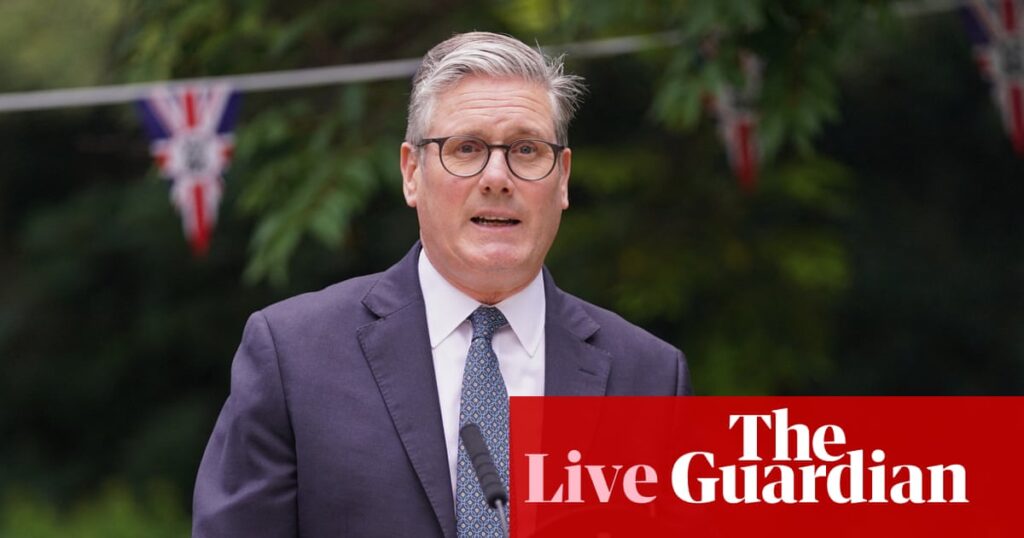Ukraine cause akin to second world war allies, Starmer says before Trump-Putin Alaska talks
Ukraine is fighting for the same values as the allies did in the second world war, Keir Starmer has said before a summit in Alaska between US president Donald Trump and Russian president Vladimir Putin.
Addressing a reception in Downing Street, including veterans, to mark the 80th anniversary of VJ Day, which marked the allies’ defeat of Japan, the prime minister said:
I sat on this terrace this very morning with President [Volodymyr] Zelenskyy, who is fighting for the same values as we were fighting for. And so when we say never forget, we must pass on the stories of those who have gone before us.
It came as Trump suggested European leaders could be invited to a second meeting if the summit is successful. Trump will meet Putin on Friday at the summit which could see the drawing up of peace terms for Ukraine.
Trump and Starmer have spoken optimistically about a potential ceasefire, including at a virtual meeting of Ukrainian allies on Wednesday.
Leaders of the European-led ‘coalition of the willing’ could then join talks between Trump, Putin and Zelenskyy to end the war. The PA news agency understands that Starmer will attend a meeting if he is invited.
Also today, defence secretary John Healey is on morning media round for the government, while shadow defence secretary James Cartlidge is doing the same for the Conservatives. I’ll bring you any interesting lines from them in a moment.
But first, in other developments:
Key events
An arts venue has said it has not banned Scotland’s deputy first minister Kate Forbes from the building after a row over her speaking at an event, reports the PA news agency.
Forbes was interviewed on stage at the Summerhall in Edinburgh as part of a Fringe show on 7 August organised by the Herald newspaper.
The deputy first minister is a devout Christian and a member of the socially conservative Free Church of Scotland, and she was criticised during her SNP leadership battle for her stance on gay marriage, abortion and trans rights.
In an email to artists on the day of the event, Summerhall said Herald Unspun was programmed before the lineup of interviewees was confirmed. It described the booking as an “oversight” and said it “should have considered the likelihood of her being booked to attend, and the understandable upset it would cause”.
According to the PA news agency, the venue said it will be writing “robust, proactive inclusion and wellbeing policies that prevent this from happening again”.
It said Herald Unspun was not curated by Summerhall and at this stage would not comment on future curated events and the possibility of Forbes appearing. However in a statement on Friday it said Forbes is not banned from the building. It said:
The Fringe event passed without incident.
Forbes is not banned from the Summerhall building which encompasses a cafe, pub, arts venues, galleries and independent traders’ offices and studios.
It said speakers including first minister John Swinney, Scottish Labour leader Anas Sarwar and Forbes “all entered and exited the building the same way for the events over each day”. It added:
The events, the Herald Unspun events, were a paid hire and programmed by The Herald newspaper.
Forbes has said she “fervently” believes in freedom of speech. She said:
Any effort to cancel people, especially politicians, undermines democracy.
Many people attended the Herald event and it is important that we could freely discuss and debate matters in a respectful manner.
I respect and acknowledge the fact that, in a liberal democracy, there are people who will agree with me and others who will disagree with me.
That is all the more reason to create events where the audience and journalists can question politicians openly, as the Herald did.
The PA news agency reports that in an email sent to artists on 7 August and addressed to “Dear companies”, Summerhall said:
At this point, our main concern is that cancelling the event could pose significant additional risk to the safety and wellbeing of LGBTQ+ artists, staff and audiences by attracting those who share Kate Forbes’s views outside of these walls to Summerhall, and as such the interview will take place as scheduled, with all proceeds from the event donated to a local LGBTQ+ charity, the amount and the recipient will be published as soon as possible.
While the event is happening, staff will be on hand to help anyone who may wish to make use of a designated relaxed space.
We do not believe LGBTQ+ rights, nor their existence, is up for debate. We recognise that the LGBTQ+ community make up a significant proportion of our artists, audiences and staff, and we have work to do to repair the damage from this oversight.
At this stage, we can guarantee that we will be writing robust, proactive inclusion and wellbeing policies that prevent this from happening again.
A Labour councillor who called for far-right activists’ throats to be cut at an anti-racism rally after the Southport murders has been found not guilty of encouraging violent disorder, reports the PA news agency.
Ricky Jones, 58, faced trial at Snaresbrook crown court accused of the offence after he described demonstrators as “disgusting Nazi fascists”. A video showing Jones addressing crowds on Hoe Street in Walthamstow, east London, on 7 August last year went viral on social media after the protest, which had been organised in response to plans for a far-right march outside Waltham Forest Immigration Bureau.
The now-suspended councillor, wearing a black polo top and surrounded by cheering supporters, said:
They are disgusting Nazi fascists. We need to cut all their throats and get rid of them all.
He also drew his finger across his throat as he spoke to the crowd.
According to the PA news agency, jurors deliberated for just over half an hour and found him not guilty on Friday.
The 58-year-old, who at the time was also employed as a full-time official for the Transport Salaried Staffs’ Association (TSSA) union, was arrested on 8 August last year and interviewed at Brixton police station that night.
Jones, who has been a borough councillor in Dartford, Kent, since 2019, was suspended by the Labour party the day after the incident.
Giving evidence in his trial, Jones said his comment did not refer to far-right protesters involved in the riots at the time, but to those who had reportedly left National Front stickers on a train with razor blades hidden behind them. Before he made the comment, jurors were shown video where he said to crowds:
You’ve got women and children using these trains during the summer holidays. They don’t give a shit about who they hurt.
He told the court he was “appalled” by political violence, adding:
I’ve always believed the best way to make people realise who you are and what you are is to do it peacefully.
Jones, who said he was on the left of the Labour party, previously told jurors the riots had made him feel “upset” and “angry” and said he felt it was his “duty” to attend counter-protests, despite being warned to stay away from such demonstrations by the Labour party.

Sally Weale
One of the messages the education secretary was keen to get across during her media round on A-level results was the government’s commitment to tackling the “yawning inequalities” in educational attainment in England.
Bridget Phillipson, a Sunderland MP who grew up in the north-east, is all too well aware of educational disadvantage and how some regions are worse affected than others. In the run-up to results day, she has made a point of drawing attention to poor exam outcomes for students from white working-class backgrounds.
She says the government’s “plan for change”, which includes reformed early years and revitalised family services, alongside wider efforts to tackle disadvantage such as expanding free school meals and free breakfast clubs, will help address inequalities. But is it enough to bring about real change?
Regional disparities in education are nothing new, but what has concerned experts is that this year’s results reveal that the gap between the strongest and weakest performing areas in England has grown even wider.
You can read more of this analysis from the Guardian’s education correspondent, Sally Weale, here:

Richard Adams
Ministers have vowed to tackle England’s “entrenched” educational gaps that are leaving some regions and groups trailing far behind their peers and closing off options such as university for many of their school leavers.
A-level results published on Thursday showed an improving national picture, with a higher proportion of young people gaining top grades. But the improvements faded outside London, the south-east and big cities.
While one in three entries from 18-year-olds in London gained A* or A grades, fewer than one in four did so in the north-east of England, where results remain below pre-pandemic levels seen in 2019.
London’s advantage means that the university application rate for its students remains considerably above all other English regions, even as record numbers of school leavers accepted offers to begin higher education courses this autumn.
The Department for Education said that the results “have exposed inequalities which continue to exist in the education system”, which it aims to tackle in a schools white paper later this year.
Bridget Phillipson, the education secretary, said:
Every single young person collecting their results should have the opportunity to pursue their dreams – whether that starts with further study, university, an apprenticeship or the world of work – but too often, opportunities depend on background rather than talent.
The entrenched divide in outcomes seen over the last few years and the lack of progress for children from white working-class backgrounds is particularly concerning.
Carl Cullinane, director of research at the Sutton Trust, which campaigns to improve social mobility through education, said:
If the government is going to break down barriers to opportunity, the growth in regional inequalities must be reversed.
It’s positive that increasing numbers of young people from the most deprived areas are getting into university. This is important, because gaining a university degree remains the surest route to social mobility. However, today’s figures show the gap between the most and least deprived areas remains wide, and worse than before the pandemic in 2019.

Diane Taylor
Asylum seekers locked in detention centres as part of Labour’s “one in, one out” deal have said they had not heard of the scheme before arriving in the UK on small boats and were terrified of being returned to their home countries.
The prime minister, Keir Starmer, has said the plan to send one small boat arrival back to France in exchange for accepting another to live in the UK would deter the thousands from crossing the Channel.
Since the first group of small boat arrivals were detained just over a week ago on 6 August, 2,363 people have crossed the Channel. More than 50,000 have crossed since Labour came into power.
“I was so happy to survive the journey across the Channel and to reach land in the UK. Then the Home Office locked me up. I’m still in a state of shock,” said one man from Eritrea, speaking to the Guardian by phone from a detention centre.
We did not understand what was happening to us when the Home Office moved us from Manston [the former military base in Kent] where we were processed, straight to this place which is like a jail.
When we asked why they were bringing some who arrived on the same boat as me here but letting others go free, they did not answer us. They just said it was because we crossed the Channel illegally.
The man said that neither he nor anyone he knew in northern France knew anything about the “one in, one out” deal and was not sure it would prevent people from continuing to try to cross the Channel.
I am very frightened here. There are people who have committed crimes in the UK locked up with us. We have done nothing wrong apart from trying to find a safe place.
He claimed to have been trafficked and tortured when he passed through Libya on his journey from Eritrea. “I believe if I am sent back to France and the smugglers find me they will kill me,” he said.
The Green party have won the Grangetown Cardiff council byelection, gaining a seat from Labour. Marking the victory on X, the party congratulated Matt Youde of the Cardiff Green party on being elected in the Grangetown ward. He received 24% of the vote, beating Labour’s Khuram Chowdhry.
Here are the results from the byelection:
-
Green party (Matt Youde) – 24%
-
Welsh Labour (Khuram Chowdhry) – 22.7%
-
Plaid Cymru (Neil Roberts) – 18.7%
-
Reform UK (Joseph Martin) – 14.5%
-
Propel (Vincent Yewlett) – 9.6%
-
Independent (Ahmed Samater) – 4.6%
-
Welsh Conservative party (James Hamblin) – 4.1%
-
Welsh Liberal Democrats (Irfan Latif) – 1.8%
The byelection, triggered by the resignation of Labour councillor Sara Robinson, had a turnout of 26.7%.
John Healey said the VJ Day anniversary was a “special moment of pride” and “one of the final anniversaries” in which people will be able to hear the stories of veterans, report
The defence secretary told Sky News:
We made big, big play and had big celebrations to mark 80 years of Victory in Europe Day three months ago.
But for many, the war continued, and this is a chance to honour those who served, many, who sacrificed their lives, British and Commonwealth soldiers, in a battle that wasn’t just a battle against an enemy, but a battle against the jungle and tropical diseases and great privation and hardship in prisoner of war camps as well.
And for many who did come home, they regarded themselves as the forgotten army, and we owe them that duty today to remember their service and remember all they gave to bring peace finally, after the second world war.
And I have to tell you, this is a moment of special pride for me as defence secretary, to be alongside around 30 of those VJ veterans today – teenagers when they went out to fight, now over 100 years old, and this will be one of the final anniversaries in which we’ll be able to mark their service and hear their stories.
He also added that VJ Day offers lessons that can be used in the diplomatic response to the Ukraine war.
Asked what lessons can be applied in the present day as Donald Trump meets Vladimir Putin for a high-stakes summit in Alaska, the defence secretary told BBC Breakfast:
The first lesson is that military and fighting solves nothing in the end, and that the end to war must come through talking, must come from diplomacy.
And so today in Alaska is what I hope, we all hope to see, a first step towards serious negotiations.”
Theologian in Jenrick xenophobia row says pair ‘could work together’

Diane Taylor
The theologian who accused Robert Jenrick of xenophobia on the BBC has invited the shadow justice minister to work with him to ease tensions over migration rather than “ramping up anti-immigrant sentiment”.
Dr Krish Kandiah’s comments on Radio 4’s Thought for the Day, raising concerns about Jenrick’s remarks about the safety of his daughters because of small boat arrivals, caused a row after a complaint from the shadow justice secretary, with the item being retrospectively edited by the BBC.
Kandiah expressed concern about the current atmosphere relating to migration and said he was extending an olive branch to Jenrick in the hope the two men could work together on the issue.
The initial remarks by Kandiah, who heads the Sanctuary Foundation refugee charity, prompted an angry response from Jenrick. The BBC said it had removed “some of the language used” by Kandiah from a version of Thought for the Day posted online, saying it was not appropriate for the faith-based radio segment.
In his statement, Kandiah said:
Mr Jenrick, I want your daughters and mine to be able to walk down the road safely and without fear. I worked with you when you were housing minister and the UK welcomed over 200,000 people from Hong Kong.
I was grateful for your support and compassion during that time. I would love to find a way we could work together to de-escalate the fear and anger many are feeling in our country. I believe we need to focus on the real challenges that are making people worried – housing, jobs and the cost of living – rather than ramping up anti-immigrant sentiment.
Farage urges Starmer to appoint Reform peers to House of Lords

Matthew Weaver
Nigel Farage has called for the right to nominate Reform UK supporters to the House of Lords, claiming this would address a “democratic disparity”.
The demand was dismissed by the defence secretary, John Healey, who said parliament would not benefit from “more Putin apologists”.
In a letter to Keir Starmer, the Reform leader said it was unfair that other smaller parties, including the Greens, had peers in the upper chamber but his party did not, despite attracting more votes in the general election last year.
In what Farage described as a “modest request”, he said it was time that Reform was represented in the House of Lords. He wrote:
Reform UK wishes to appoint life peers to the upper house at the earliest possible opportunity.
Political appointments to the Lords are made at the discretion of the prime minister, who is under no constitutional obligation to elevate opposition figures to the Lords. But under political convention, No 10 invites opposition leaders to nominate candidates for peerages.
Downing Street has yet to respond to Farage’s demand, but speaking on LBC, Healey said Farage wanted to fill the Lords with “his cronies”. He also pointed out that Farage had previously called for the abolition of the Lords.
Healey said:
I’m not sure that parliament’s going to benefit from more Putin apologists like Nigel Farage, to be honest.
Asked whether that accusation was “a bit strong”, Healey replied:
Look at what he’s said about Russia, look at what he’s said about Putin in the past.
John Healey said suggestions that Russian occupation in parts of Ukraine and a minerals deal featuring in any truce were “all hypotheticals”.
Asked whether the UK would back those ideas, the defence secretary told Sky News:
I think those are all hypotheticals. This is, as President Trump said, a first meeting, there’s an important principle, once serious negotiations start, that there can be no decisions about Ukraine without Ukraine.
So his declaration of bringing President Zelensky into the discussions is important, just as the aim to secure an unconditional ceasefire, to allow the negotiations to take place, is an important part of what I hope we will start to see as a result of the discussions today.
But this, in the end, is a question and a pressure on Putin. Will he do what he says? Is he ready, as he says, for peace, and will he step back from the war that he’s been waging on Ukraine now for three-and-a-half years without succeeding in securing any of his strategic objectives, and having lost over a million Russian casualties during that time.
This is a huge human cost, both to Russia, but especially to Ukraine.
Defence secretary says Trump-Putin talks are ‘first steps’ that could lead to ‘serious negotiations’
John Healey said the talks between Donald Trump and Vladimir Putin were “first steps” towards a potential peace which could lead to “serious negotiations” which involve Ukraine in the future.
Asked whether Friday’s meeting between the two leaders in Alaska – and a possible joint press conference – was simply a “reward” for Putin, the defence secretary told Times Radio:
It’s a recognition that you can only end fighting by talking. And to have talking and serious negotiation, it requires someone to broker those talks.
President Trump is playing that role in a way that only President Trump can, and it’s why we and other European leaders and Ukraine have been willing to give President Trump our full support in trying to take these first steps.
Asked whether the US president’s approach to Russia meant the UK needed to change its approach to Russia, he said:
Well, I think, well, first of all, we need to see what happens in the discussions today and whether they lead to serious negotiations that will properly involve Ukraine in the future.
But our first priority, is to continue to stand with Ukraine, as we have since the outset of this full scale war, to step up our support for the diplomatic pressure and the economic pressure on Putin, but also to keep a focus on the frontline while all eyes are on Alaska, because we can’t jeopardise the peace by forgetting about the war.
The “pressure and the focus” must be on Putin as the talks get under way, he said.
The defence secretary dismissed suggestions that the UK’s approach to the Ukraine war was to “watch and wait” as US president Donald Trump holds talks with Vladimir Putin over a potential deal.
Asked whether Britain’s role was to “watch and wait”, John Healey told BBC Breakfast:
No, the UK’s role is to stand with Ukraine on the battlefield and in the negotiations, and prepare as we have been, leading 30 other nations with military planning for a ceasefire and a secure peace through what we call the coalition of the willing.
Our role is to lead the charge as we have been on more intensive diplomacy, to lead the charge on military aid to Ukraine so that we don’t jeopardise the peace by forgetting about the current war, and being ready also to step up economic pressure on Putin if he’s not willing to take the talks seriously.
House of Lords does not need ‘Putin apologists like Farage’, defence secretary says
Parliament will not benefit from “more Putin apologists”, a cabinet minister said, as he poured cold water on Nigel Farage’s call for the prime minister to allow him to appoint peers to the Lords.
Farage has previously pushed for reform of the upper chamber, saying it is too large and needs to be made more democratic.
According to the PA news agency, when asked about the Reform UK leader’s demands, defence secretary John Healey told LBC “the same Nigel Farage that called for the abolition of the House of Lords” wanted to fill it with “his cronies”.
He then added:
But look, I’m not sure that parliament’s going to benefit from more Putin apologists like Nigel Farage, to be honest.
Asked whether that accusation was “a bit strong”, Healey replied:
Look at what he’s said about Russia, look at what he’s said about Putin in the past. Look [at] what he said in the middle of the general election campaign.
At this point, when maximum pressure needs to be put on Putin to support Ukraine in negotiations, when the maximum condemnation of Putin is required from someone who is sitting down with Trump in Alaska but turning up the attacks on Ukraine, it needs all voices.
And I have to say, the voice of Reform is conspicuously absent in any of our discussions and any of our defence debates about Ukraine and about Russia. And I’d really welcome Nigel Farage weighing in alongside us and the other parties in the House of Commons to condemn Putin and to work, as we’re trying to do as well, to reinforce the prospects of peace.
Ukraine cause akin to second world war allies, Starmer says before Trump-Putin Alaska talks
Ukraine is fighting for the same values as the allies did in the second world war, Keir Starmer has said before a summit in Alaska between US president Donald Trump and Russian president Vladimir Putin.
Addressing a reception in Downing Street, including veterans, to mark the 80th anniversary of VJ Day, which marked the allies’ defeat of Japan, the prime minister said:
I sat on this terrace this very morning with President [Volodymyr] Zelenskyy, who is fighting for the same values as we were fighting for. And so when we say never forget, we must pass on the stories of those who have gone before us.
It came as Trump suggested European leaders could be invited to a second meeting if the summit is successful. Trump will meet Putin on Friday at the summit which could see the drawing up of peace terms for Ukraine.
Trump and Starmer have spoken optimistically about a potential ceasefire, including at a virtual meeting of Ukrainian allies on Wednesday.
Leaders of the European-led ‘coalition of the willing’ could then join talks between Trump, Putin and Zelenskyy to end the war. The PA news agency understands that Starmer will attend a meeting if he is invited.
Also today, defence secretary John Healey is on morning media round for the government, while shadow defence secretary James Cartlidge is doing the same for the Conservatives. I’ll bring you any interesting lines from them in a moment.
But first, in other developments:

